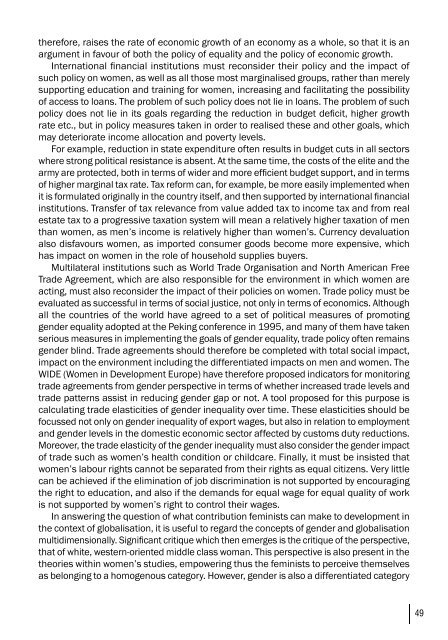art-e-conomy _ reader - marko stamenkovic
art-e-conomy _ reader - marko stamenkovic
art-e-conomy _ reader - marko stamenkovic
You also want an ePaper? Increase the reach of your titles
YUMPU automatically turns print PDFs into web optimized ePapers that Google loves.
therefore, raises the rate of economic growth of an e<strong>conomy</strong> as a whole, so that it is an<br />
argument in favour of both the policy of equality and the policy of economic growth.<br />
International financial institutions must reconsider their policy and the impact of<br />
such policy on women, as well as all those most marginalised groups, rather than merely<br />
supporting education and training for women, increasing and facilitating the possibility<br />
of access to loans. The problem of such policy does not lie in loans. The problem of such<br />
policy does not lie in its goals regarding the reduction in budget deficit, higher growth<br />
rate etc., but in policy measures taken in order to realised these and other goals, which<br />
may deteriorate income allocation and poverty levels.<br />
For example, reduction in state expenditure often results in budget cuts in all sectors<br />
where strong political resistance is absent. At the same time, the costs of the elite and the<br />
army are protected, both in terms of wider and more efficient budget support, and in terms<br />
of higher marginal tax rate. Tax reform can, for example, be more easily implemented when<br />
it is formulated originally in the country itself, and then supported by international financial<br />
institutions. Transfer of tax relevance from value added tax to income tax and from real<br />
estate tax to a progressive taxation system will mean a relatively higher taxation of men<br />
than women, as men’s income is relatively higher than women’s. Currency devaluation<br />
also disfavours women, as imported consumer goods become more expensive, which<br />
has impact on women in the role of household supplies buyers.<br />
Multilateral institutions such as World Trade Organisation and North American Free<br />
Trade Agreement, which are also responsible for the environment in which women are<br />
acting, must also reconsider the impact of their policies on women. Trade policy must be<br />
evaluated as successful in terms of social justice, not only in terms of economics. Although<br />
all the countries of the world have agreed to a set of political measures of promoting<br />
gender equality adopted at the Peking conference in 1995, and many of them have taken<br />
serious measures in implementing the goals of gender equality, trade policy often remains<br />
gender blind. Trade agreements should therefore be completed with total social impact,<br />
impact on the environment including the differentiated impacts on men and women. The<br />
WIDE (Women in Development Europe) have therefore proposed indicators for monitoring<br />
trade agreements from gender perspective in terms of whether increased trade levels and<br />
trade patterns assist in reducing gender gap or not. A tool proposed for this purpose is<br />
calculating trade elasticities of gender inequality over time. These elasticities should be<br />
focussed not only on gender inequality of export wages, but also in relation to employment<br />
and gender levels in the domestic economic sector affected by customs duty reductions.<br />
Moreover, the trade elasticity of the gender inequality must also consider the gender impact<br />
of trade such as women’s health condition or childcare. Finally, it must be insisted that<br />
women’s labour rights cannot be separated from their rights as equal citizens. Very little<br />
can be achieved if the elimination of job discrimination is not supported by encouraging<br />
the right to education, and also if the demands for equal wage for equal quality of work<br />
is not supported by women’s right to control their wages.<br />
In answering the question of what contribution feminists can make to development in<br />
the context of globalisation, it is useful to regard the concepts of gender and globalisation<br />
multidimensionally. Significant critique which then emerges is the critique of the perspective,<br />
that of white, western-oriented middle class woman. This perspective is also present in the<br />
theories within women’s studies, empowering thus the feminists to perceive themselves<br />
as belonging to a homogenous category. However, gender is also a differentiated category<br />
49


